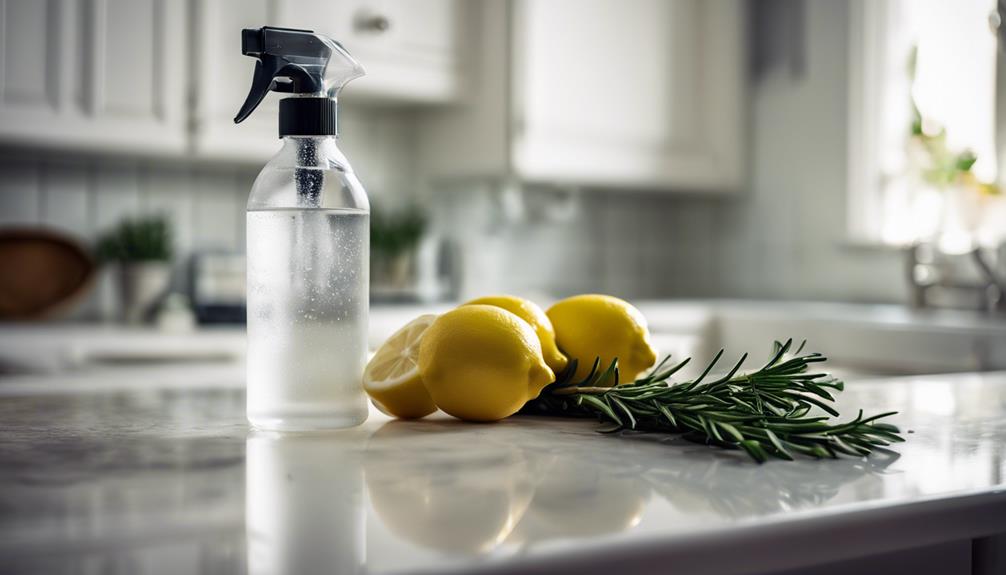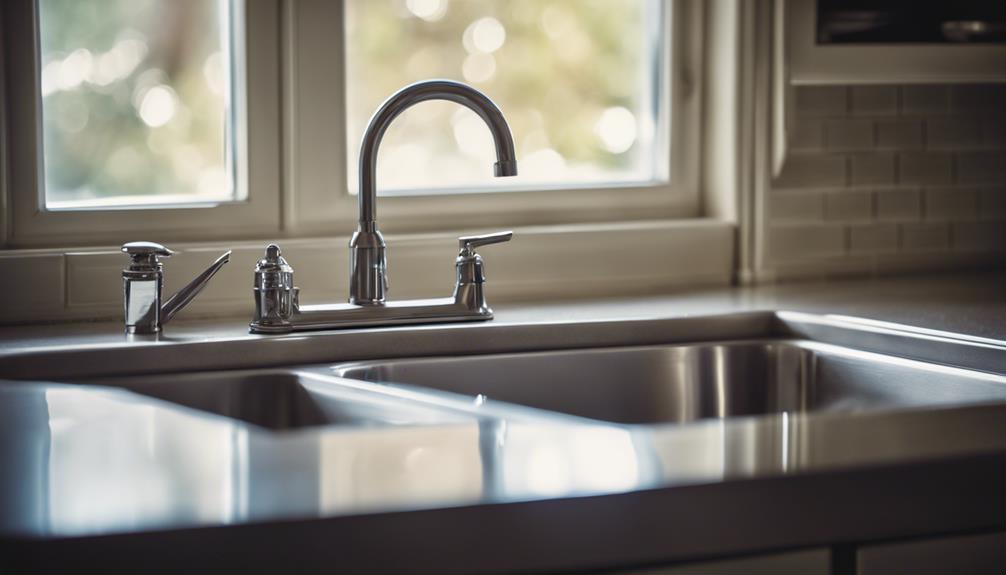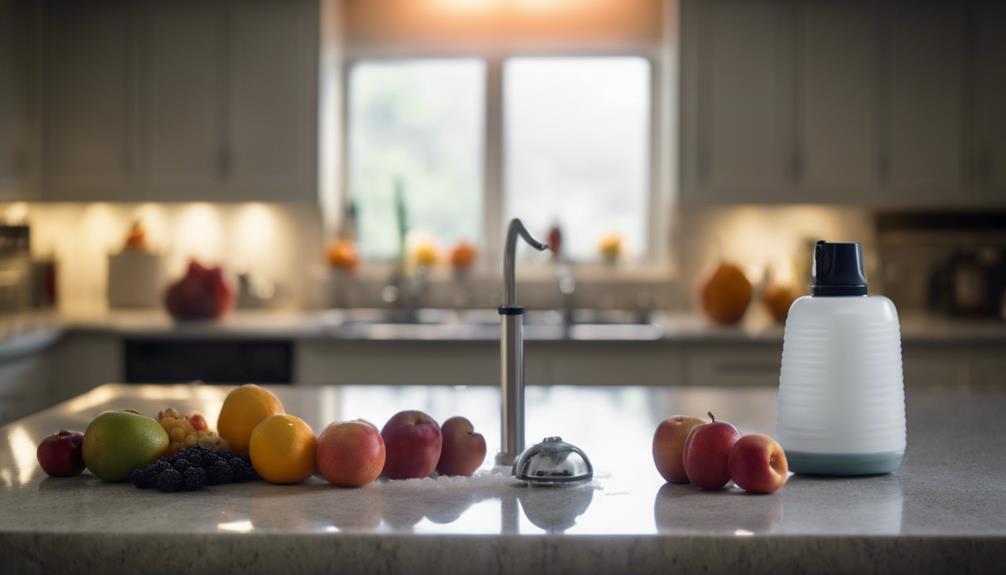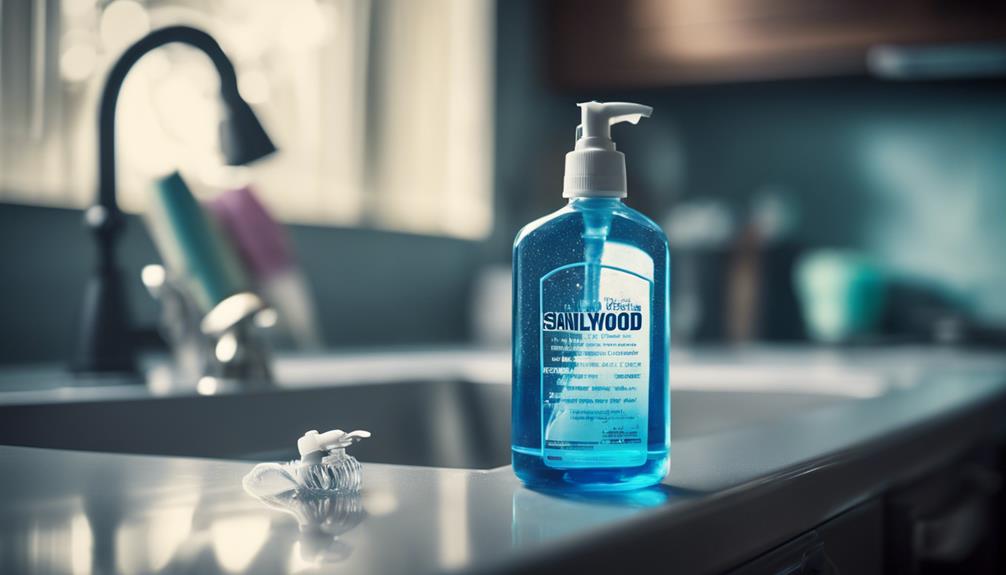You play an important role in keeping your kitchen clean and hygienic. To sanitize your kitchen counters, you can start with soap and water, a simple yet effective method. For tougher jobs, try a bleach solution or a vinegar-based sanitizing method. Baking soda scouring powder is great for tough stains and grease. Microfiber cloths and steam cleaning are also effective. For a natural approach, use essential oils like tea tree oil or eucalyptus oil. If you want a more conventional method, try a dish soap sanitizing solution or quaternary ammonium sanitizing. Explore these options and discover the best fit for your kitchen.
Soap and Water Cleaning
When tackling kitchen counter cleanliness, start with a soap and water cleaning routine, a simple yet effective method for removing dirt, grime, and germs. This basic yet powerful combination helps eliminate surface contaminants and is gentle on most countertop materials. You'll be surprised at how well warm, soapy water can clean and sanitize your kitchen counters without harsh chemicals.
As you clean, you're not only removing visible dirt and grime, but also tackling invisible bacteria and germs that can spread illness. Regular soap and water cleaning helps maintain a hygienic environment, making it an essential part of your kitchen cleaning routine. This method is safe, practical, and easy on your wallet, making it a great option for daily cleanups.
For disinfecting jobs, soap and water can be a powerful first step, helping to loosen dirt and grime before moving on to more intense sanitizing methods. By incorporating soap and water cleaning into your daily routine, you'll be well on your way to a clean, germ-free kitchen.
Bleach Solution Sanitizing
You can take your kitchen counter sanitizing to the next level with a bleach solution, a potent disinfectant that effectively eliminates germs and bacteria.
To sanitize your kitchen counters, mix 1/2 cup of bleach with 1 gallon of water. This solution is strong enough to kill germs, yet gentle enough not to damage most countertops.
Before applying the bleach solution, make sure to test it on a small, inconspicuous area to confirm it won't damage the surface.
Once you've mixed the solution, apply it to the countertops and let it sit for five minutes to allow for optimal disinfection. Remember to ventilate the area well, as bleach can be harsh on your lungs.
After the five minutes are up, wipe down the counters with a clean cloth or paper towel. Be sure to follow the specific instructions for dilution ratios and contact times to ensure proper disinfection.
Vinegar-Based Sanitizing Method

For a natural and eco-friendly approach to sanitizing your kitchen counters, try a vinegar-based method that harnesses the power of acid to eliminate germs and bacteria. This method is a great alternative to harsh chemicals, and it's incredibly easy to implement.
Simply mix equal parts white vinegar and water in a spray bottle, and you're ready to disinfect your kitchen countertops. Spray the solution onto your countertops, let it sit for at least 5 minutes, and then wipe it down with a clean cloth. The acid in the vinegar will help break down and eliminate bacteria and viruses on the surface.
This vinegar-based sanitizing method is safe for most countertop materials and can be a cost-effective way to maintain hygiene. By regularly sanitizing with vinegar, you can help prevent the spread of illnesses and keep your kitchen clean. Give it a try and see the difference for yourself!
Baking Soda Scouring Powder
Baking soda's gentle abrasive properties make it an ideal scouring powder for tackling tough stains and grease on your kitchen counters.
As a non-toxic alternative to harsh chemical cleaners, you can trust baking soda to get the job done without compromising the safety of your food preparation areas.
To use, simply mix baking soda with water to form a paste, and apply it to specific areas of your countertops that need a deeper clean. The mild abrasive properties of baking soda will scrub away grime without scratching or damaging the surface of your countertops.
Regular use of baking soda as a scouring powder can help maintain a clean and hygienic kitchen environment. When you incorporate baking soda into your cleaning routine, you'll be amazed at how easily it removes tough stains and leaves your countertops looking like new.
Microfiber Cloth Sanitizing

When it comes to sanitizing your kitchen counters, you'll want to reach for a trusted tool: microfiber cloths. These effective cleaning wonders not only trap and remove dirt, bacteria, and debris but also provide a streak-free shine.
Effective Cleaning Methods
You can sanitize your kitchen counters effectively by using microfiber cloths, which have been proven to trap dirt and bacteria more efficiently than traditional cleaning cloths. These fine fibers grab onto pathogens, removing them from surfaces and reducing the risk of cross-contamination.
When you pair a microfiber cloth with a disinfectant solution, you'll be able to sanitize your kitchen counters more thoroughly than with regular cloths or sponges.
To get the most out of your microfiber cloth, make sure to wash it regularly to prevent the buildup of bacteria. This way, you can reuse it multiple times, making it a cost-effective and eco-friendly cleaning option.
Studies have shown that microfiber cloths can remove up to 99% of bacteria from surfaces when used properly. By incorporating microfiber cloths into your cleaning routine, you'll be able to keep your kitchen counters clean and sanitized with ease.
Microfiber Cloth Benefits
The dense fibers of microfiber cloths create a powerful cleaning duo, snagging dirt, bacteria, and other contaminants, and trapping them within their intricate weave. When you use microfiber cloths to sanitize your kitchen countertops, you can trust that they'll effectively remove up to 99% of bacteria, promoting a healthier environment.
These cloths are incredibly effective because of their dense fibers, which create a larger surface area for better cleaning and sanitizing.
What's more, microfiber cloths are non-abrasive, making them safe to use on a variety of countertop surfaces without causing damage. You can reuse them multiple times, and they're machine washable, making them a cost-effective and eco-friendly option for sanitizing your kitchen counters.
When you pair microfiber cloths with a disinfectant cleaner, you'll be amazed at how easily they eliminate bacteria and other contaminants from your countertops. By incorporating microfiber cloths into your cleaning routine, you'll be able to keep your kitchen counters clean, sanitized, and safe for food preparation.
Hydrogen Peroxide Disinfecting
Sanitizing your kitchen counters with hydrogen peroxide is a simple, effective, and eco-friendly way to kill bacteria, viruses, and mold, providing a safe environment for food preparation.
You can create a natural and non-toxic cleaning solution by mixing hydrogen peroxide with water. This solution is perfect for disinfecting kitchen counters, and it's environmentally friendly too, as it breaks down into water and oxygen.
To sanitize your kitchen counters with hydrogen peroxide, simply spray the solution onto the surface, let it sit for a few minutes, and then wipe it off with a clean cloth. By doing so, you'll be creating a clean and germ-free food preparation area.
Regularly using hydrogen peroxide for disinfecting your kitchen counters will help maintain a safe and healthy environment for cooking and food handling. This method is easy, effective, and gentle on surfaces, making it an excellent choice for keeping your kitchen counters clean and sanitized.
Steam Cleaning Sanitization

As you consider steam cleaning sanitization for your kitchen counters, you'll want to think about the type of steam generator that's right for you, the effective steam pressure needed to kill germs, and the ideal sanitizing cycle times to guarantee a thorough clean.
These factors will help you optimize the steam cleaning process and get the most out of this sanitization method. By understanding these key elements, you'll be able to effectively sanitize your kitchen counters with confidence.
Steam Generator Options
You can effectively sanitize your kitchen counters with steam generator options, which utilize high-temperature steam to kill bacteria and germs. This method is a game-changer for maintaining a hygienic kitchen, especially for families with children and pets.
The beauty of steam generator options lies in their chemical-free and eco-friendly nature, making them a safe choice for your home. When you opt for steam cleaning, you can rest assured that you're getting a deep clean that penetrates even the most porous surfaces, eliminating hidden germs and odors.
The heat from the steam is also effective in breaking down grease and grime, leaving your countertops spotless and sanitized. By incorporating steam generator options into your cleaning routine, you'll be taking a proactive approach to maintaining kitchen hygiene and preventing the spread of illnesses through contaminated surfaces.
With regular steam cleaning, you can enjoy a cleaner, healthier kitchen that's perfect for cooking up a storm.
Effective Steam Pressure
With steam pressure sanitization, high-temperature steam blasts away 99.9% of common household germs, leaving your kitchen counters sanitized and sparkling. This method is particularly useful for individuals looking for a chemical-free and efficient way to sanitize their kitchen counters.
Here are three benefits of using steam pressure sanitization:
- Eco-friendly: Steam pressure cleaning is a chemical-free method that doesn't require harsh cleaning agents that can harm the environment.
- Deep cleaning: The high-pressure steam penetrates porous surfaces, ensuring a deep clean and thorough sanitization of your kitchen counters.
- Efficient: Steam pressure sanitization is a quick and efficient way to eliminate germs and bacteria from your kitchen counters.
Sanitizing Cycle Times
Typically, a sanitizing cycle of around 5 to 7 minutes is all it takes to effectively kill germs and bacteria on your kitchen counters using steam cleaning sanitization. During this time, the high temperature of steam, usually above 212°F, penetrates and disinfects surface areas, eliminating up to 99.9% of germs.
This eco-friendly method is chemical-free, making it a great option for maintaining a hygienic kitchen environment.
As you use steam cleaning for your kitchen counters, you can rest assured that the process is efficient in reaching cracks and crevices where bacteria may hide. Regular use of steam cleaning can help reduce the risk of food contamination and maintain a clean kitchen.
Essential Oil Sanitizing Methods
Your kitchen counters can benefit from the natural antibacterial properties of essential oils, which provide a chemical-free alternative for sanitizing. By incorporating essential oils into your cleaning routine, you can effectively kill germs and bacteria without exposing your family to harsh chemicals.
Here are three essential oils you can use to sanitize your kitchen counters:
- Tea Tree Oil: Known for its antiseptic qualities, tea tree oil is a powerful natural sanitizer that can effectively kill germs on kitchen surfaces.
- Eucalyptus Oil: Not only does eucalyptus oil provide a fresh scent, but it's also a powerful disinfectant against common household bacteria.
- Lavender Oil: Offering a calming aroma, lavender oil serves as a natural sanitizer to keep your kitchen counters clean and germ-free.
To use essential oils for sanitizing, simply dilute them with water or vinegar in a spray bottle. This eco-friendly and aromatic solution is perfect for maintaining a clean and healthy kitchen environment.
Dish Soap Sanitizing Solution

You can create a simple yet effective sanitizing solution by mixing warm water with a small amount of dish soap, a gentle and non-toxic alternative to harsh chemicals. This solution helps guarantee dirt, grease, and food particles are removed from countertops, providing a hygienic surface for food preparation. Dish soap has degreasing properties that help break down oils and residues on counters, making it a versatile and affordable sanitizing option.
Using a dish soap sanitizing solution regularly can help minimize the risk of foodborne illnesses and maintain a clean and safe kitchen environment. When you mix the solution, make sure to use warm water and a small amount of dish soap. Then, apply the solution to your countertops and wipe clean with a cloth or paper towel.
Remember to rinse and dry your countertops thoroughly after using the dish soap solution to prevent any residue buildup and ensure a clean surface. By incorporating this simple and effective sanitizing solution into your cleaning routine, you'll be able to keep your kitchen counters clean, safe, and free from harmful bacteria and germs.
Quaternary Ammonium Sanitizing
Quaternary ammonium sanitizers, commonly used in the food industry, offer a powerful solution for sanitizing kitchen counters, effectively killing germs and bacteria on contact. As a homeowner, you can benefit from their disinfectant properties to keep your kitchen countertops clean and safe.
Here are three key benefits of using quaternary ammonium sanitizers:
- Long-lasting effects: These sanitizers provide residual germ-killing effects on kitchen surfaces, ensuring your countertops remain clean for a longer period.
- Safe on various materials: Quaternary ammonium sanitizers are safe to use on different countertop materials, making them a versatile sanitizing solution.
- EPA-approved: These sanitizers have been approved by the EPA, ensuring their effectiveness and safety for use in your kitchen.
Conclusion
You've made it to the end of this exhaustive list of sanitizing methods. Congratulations! You're now equipped to turn your kitchen counters into a biohazard-free zone.
But let's be real, you're probably still going to end up with a countertop that's a petri dish of bacteria and germs. After all, who needs a social life when you can spend your Friday nights scrubbing away with a vinegar solution?
Go ahead, give your counters the TLC they deserve – or don't, we won't judge.